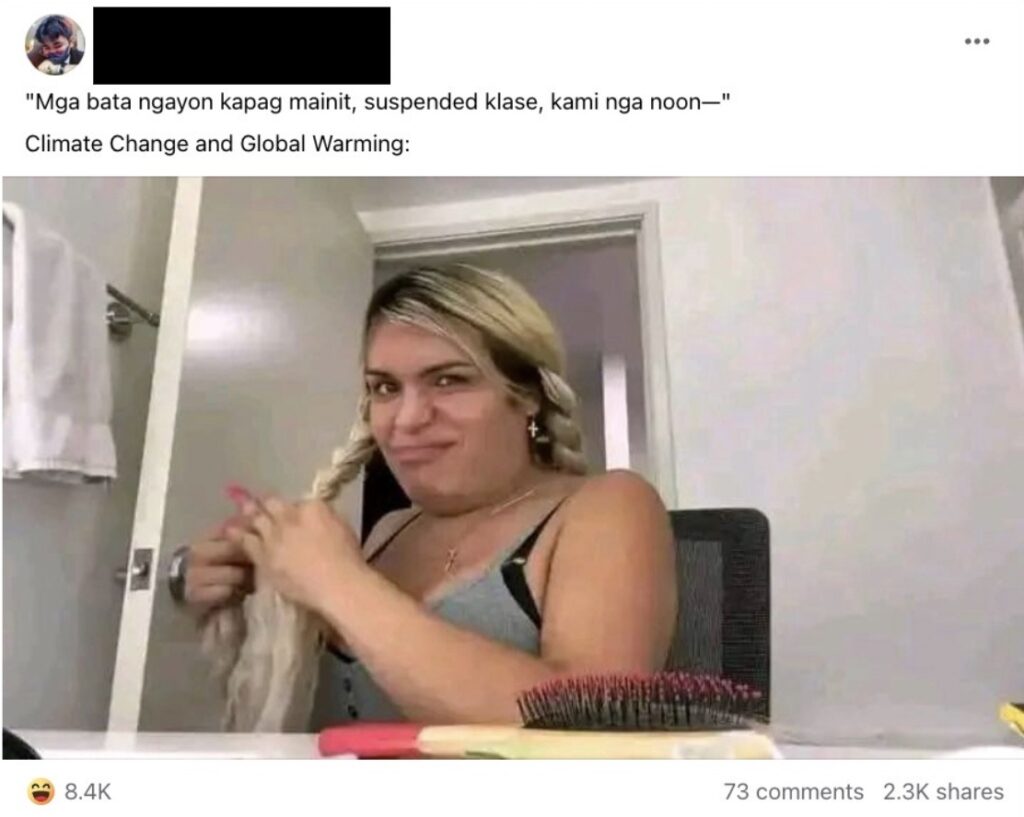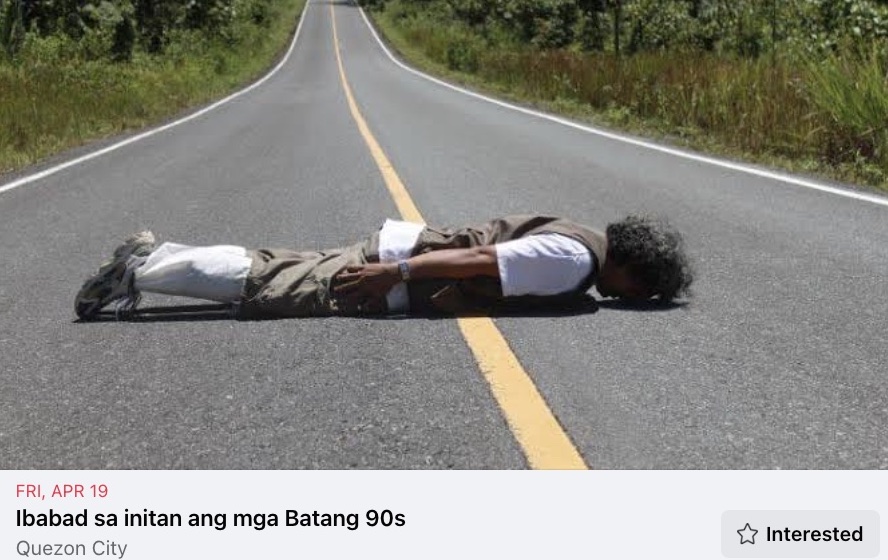A Facebook post last April 16 ignited a heated debate among social media users (very apt for the season). The post targeted the so-called ’90s bondyings‘ [immature people] who reminisce about their childhood adventures under the sun, claiming they were not afraid of the heat back then.
The post read, “What is up with these 90’s bondyings, flexing their “noong mga bata pa kami hindi kami takot maarawan? Malamang, ang average mean temperature sa Pilipinas noong dekada 90 ay nasa 25-27 C. Ngayon pumapalo na sa 42-46 C, hindi yan flex para sa dekada 90, kung di ka ba naman badoy. [What’s up with these immature people from the 90s, flexing about how ‘when we were young, we weren’t afraid of the sun’? Probably, the average mean temperature in the Philippines during the ’90s was around 25-27°C. Now it’s hitting 42-46°C, that’s not a flex for the ’90s, unless you’re clueless.]”
A post by another social media user highlighted the disparities between past and present experiences of dealing with heat. Both posts, accompanied by a meme symbolizing disdain, essentially ridicule how past generations are downplaying the struggles faced by the current generation and the significant impact of climate change.

The backlash from social media users was swift and resounding, with comments pouring in to address the misconceptions and invalidation referenced in the original posts. One user said, “Funny nga yung nagpiflex nyan, invalidating the struggles of current gen and downplaying climate change.. However, slight factual correction, may variation lang ng 1 to 3 degrees celsius ang average mean temperature ng Philippines, sa 90s, early 2000s, 2010s, and 2020s. So halos ganun pa din yung mean atmospheric temperature over the years. . Ang magkaiba lang is mas mataas ang subjective heat index nowadays, which is yung napifeel nating init sa paligid, hotter than the actual recorded temperarure.. Isa sa mga factors ay less trees, and less open spaces, and mas madaming concrete causing “heat island effect” including sa school environments. Still, funny pa din talaga idownplay ng ibang mga 90s kids yung heat index ngayon, as if it is a flex lol [It’s funny how they’re flexing, invalidating the struggles of the current generation and downplaying climate change. However, a slight factual correction: the average mean temperature of the Philippines has only varied by 1 to 3 degrees celsius in the 90s, early 2000s, 2010s, and 2020s. So, the mean atmospheric temperature has remained almost the same over the years. The only difference is that today’s subjective heat index is higher, which is the perceived warmth in the environment, hotter than the actual recorded temperature. One of the factors is fewer trees and open spaces and more concrete, which causes the ‘heat island effect,’ including in school environments. Still, it’s funny how some 90s kids downplay the heat index today, as if it’s a flex, lol.”], emphasizing that while there may be minimal changes in recorded temperatures, the subjective experience of heat has dramatically increased due to factors like urbanization and the “heat island effect.”
Another comment highlighted the absurdity of comparing past experiences, such as enduring ROTC training, to current challenges like extreme heat, emphasizing today’s genuine difficulties. This sentiment was echoed by many, condemning the tendency of some ’90s kids’ to trivialize the effects of climate change and the realities of modern living.
On the other hand, a fake Facebook event posted by Clarence Pacion has sparked both amusement and concern among social media users. The event aimed at humoring people, titled “Ibabad sa initan ang mga batang 90s, [Immerse the 90s kids in heat]” comes with a caption that reads, “Dahil hindi sila makamove on nung panahon nila, tulungan natin ang mga Batang 90s na muling maranasan ang mga dati nilang nakagawian! [Because they can’t move on from their time, let’s help the 90s kids experience again what they used to do!]” This seemingly innocuous invitation to “immerse the 90s kids in heat” has garnered a mix of reactions, ranging from chuckles to serious discussions about the dangers of extreme heat exposure.

The humorous event’s premise revolves around helping individuals from the 1990s relive their past experiences of enduring scorching hot temperatures. While it may initially sound like a playful trip down memory lane, the reality of heat-related health risks cannot be ignored. With global temperatures rising and heatwaves becoming more frequent and intense, such lighthearted jests can inadvertently trivialize the seriousness of heat-related illnesses and climate change impacts.
The discussion also delved into the generational responsibility for climate change, with some users attributing the current environmental challenges to past generations. This sparked a broader conversation about accountability and the need for collective action to address climate issues.
The social media exchange highlighted the complexities of discussing climate change within the framework of nostalgia and generational experiences. It underscored the importance of informed dialogue, factual accuracy, and a nuanced understanding of how climate realities have evolved. As discussions continue, it remains crucial to foster empathy, collaboration, and a shared commitment to addressing the challenges posed by climate change for the benefit of present and future generations.
Other POP! stories that you might like:
The Philippines is a pressure cooker right now and these posts are fire
Filipino Historian Ambeth Ocampo reacts to witty suggestions for localized ‘Cunk on Earth’
‘Hit or Miss?’: Social media users divided on Ryosuke Kiyasu’s drum solo in Bacolod
Charles Barkley’s jab at the lack of Filipino NBA draftees riles Filipino basketball fans
4th Impact member breaks silence about ‘dog hoarding’ issue, urges people to ‘stop the hate’



